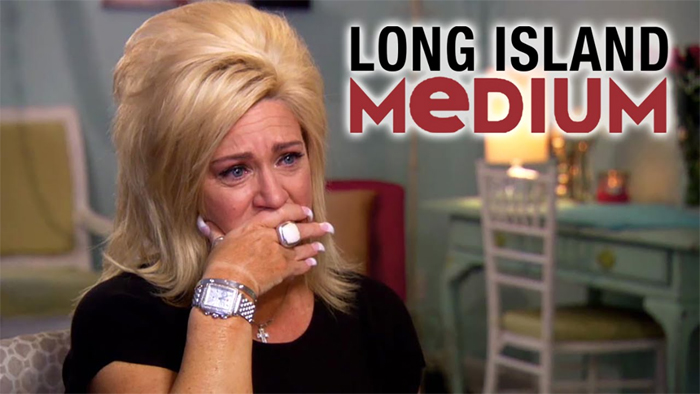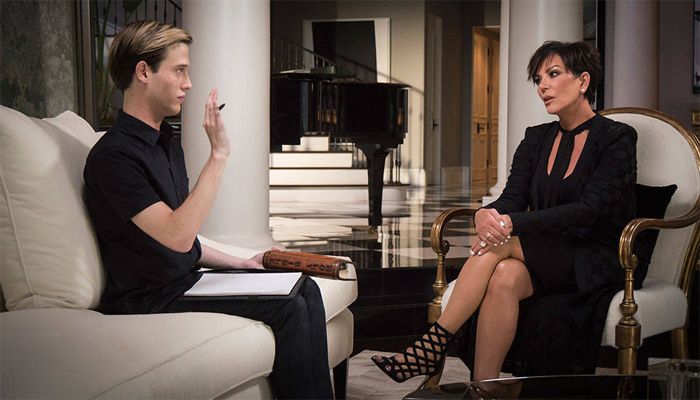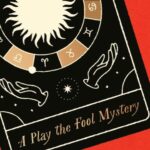How Grief Books by Mediums Harm the Living and the Dead
On Empty Messages from the Other Side
She pulls up the driveway in her black Range Rover, her squared-off French manicured talons wrapped around the steering wheel. As she exits the car, she says, “Oh my god, this wind is messin’ up my hair!” That hair is, of course, bottle blonde, teased and sprayed into its signature pouf.
She knocks on the door to the Port Jefferson ranch house, and a young woman answers. “Hi, Nicole? Do you know who I am? So what happens when Theresa Caputo shows up to someone’s house and knocks on the door and says ‘hey’?”
“I’m gonna have a reading?” Nicole says, palm to her chest in shock.
Shrieks ensue. “This is knock ’n shock, Long Island Medium on Long Island!”
Through tears and sniffles, Nicole says, “I’ve been feeling like, sad about things lately so, I know that maybe this would give me what I need and help put me back on the right track.”
Nicole’s hopes for her reading echo those of just about everyone else who appears on TLC’s Long Island Medium. Caputo claims that she can talk to the dead—that she is a link between our physical world and “the Other Side,” where what she calls “Spirit” (an amalgamation of dead souls) lives. During a reading, she delivers messages from souls that “come through.” These messages almost always boil down to “I’m fine” or “I want you to be happy.”
People on the show often speak of feeling validation that those who have died are still with us in some way. This validation is underlined by a refrain Caputo often repeats, her mission statement of sorts: “I want you to know that there truly is more to life than here in the physical world, that when we lose a loved one, the only thing that we lose is that physical connection.”
In Caputo’s reading for Nicole—which aired during the third episode of the current and tenth season of Long Island Medium—Nicole’s mother, who died of ALS, “comes through.” In order to prove to Nicole that it’s really her mother’s soul being channeled, Caputo asks questions like, “Did her hand, like, tighten up? Because she said, ‘My hands changed.’” Towards the end of the reading, Caputo goes quiet and writes in her notebook, composing “automatic writing.” “Sometimes, Spirit will use the pen as a voice,” Caputo explains.
The letter reads, “Always know my love for you is greater than life itself. Always know that my love for you grows in heaven. Always know that my love for you will never die…”—generic sentiments, but sentiments Nicole apparently needed to hear.
“I was shaking and I just could feel that my mom wrote that letter to me through Theresa,” Nicole says. “To know that my mom is with me and was with me at my wedding and has seen everything that I’ve done just means everything to me—it makes me feel whole again.”

Long Island Medium has been airing such readings on TLC since 2011. A typical episode may feature a combination of a “knock n’ shock” reading like Nicole’s; a scheduled reading at Caputo’s home in Hicksville; a group reading or ticketed show; and an in-the-wild reading, in which Caputo picks up on Spirit while she’s at, say, a hair salon or Italian provisions store. In this last kind of reading, Caputo will approach a stranger, explain that she can talk to the dead, and ask open-ended questions like, “Did someone pass from the chest?” which can encapsulate everything from breast cancer to heart failure. It’s what she’s been pilloried for on Saturday Night Live, with Kate McKinnon spoofing her shellacked hair and Lawn Guyland accent. “I mean, would you look at that hunk of prosciutt’, isn’t that gorgeous? Who’s the young man who passed suddenly?”
Despite—or more likely because of—the spectacle that Caputo presents, her TV show has been a commercial success, one that she has parlayed into two books: the second of which, Good Grief: Heal Your Soul, Honor Your Loved Ones, and Learn to Live Again, came out last month.
The book is broken into 31 short chapters that are meant to guide the reader through the grieving process, though Caputo acknowledges that “everyone grieves differently, and our emotions bounce around like a wild kid in a bouncy castle.” Her topics range from so-called “destiny windows” (“a window of time . . . during which we will bid arrivederci”) that are meant to help readers understand that we can never stop a death to less woo-woo concepts like exercising self-care. Each chapter ends with a “Healing Moment”—homework to help find a “new normal”—like meditating to imagine the “murky gray energy” that angry feelings cause turning into “twinkly white light.”
What sets Good Grief apart from other self-help books about grief is, of course, that Caputo claims to have privileged information from the people we’re grieving. This message is distilled in a line from the introduction, which echoes with the refrain from her TV show: “Spirit needs you to know there’s more to life than what’s here in the physical world, and that your loved ones are still with you, just in a different way.”
Discussions about Caputo and other television mediums, like Tyler Henry (star of the E! show Hollywood Medium) typically revolve around whether or not they’re for real. Most critics agree that Caputo and Henry “cold read,” or throw out vague questions like “How do you connect with the number 2?” that are bound to spark with someone. Some, like Bobby Finger at Jezebel, argue that Henry—a 21-year-old from small-town California who looks like a mash-up of Macaulay Culkin and Aaron Carter—researches his clients ahead of time, or “hot reads” them, too. Since Henry only reads celebrities, it’s hard to believe that he doesn’t know anything about them. I mean, how can you not know that Bobby Brown—who will appear on an upcoming episode of Hollywood Medium—was married to Whitney Houston?
A skeptic’s bullshit alarm should ring incessantly while reading Good Grief, but admittedly mine didn’t—mostly because I’m not all that interested in disproving Caputo’s claims, even if I don’t believe in her “gift.” I’m less interested in uncovering Caputo and Henry as shams and more interested in why those who appear on their shows and watch them religiously are willing to believe in their claims. If their methods are so easy to debunk, why has Caputo’s show stretched into its tenth season and why did Henry’s get fast-tracked for a flashier second? If the ability to communicate with the dead is not rooted in reality, then what keeps fans flocking to signings for Henry’s book Between Two Worlds: Lessons from the Other Side, which was published last fall?
*
I have been watching Long Island Medium since its first season, drawn in at first by McKinnon’s SNL spoof and the fact that I, a fellow Italian-American from Long Island, grew up around women who looked like Caputo.
I’ve kept watching partially out of morbid fascination, and partially out of the unsettling realization that if I were to overcome my skepticism, I might be the kind of person who seeks out Caputo’s services. In a reading with me, Caputo would probably allude to a mother figure and a father figure—my parents. My mom died of lung cancer when I was twelve, and my dad died two years later of prostate cancer.
One of the hardest things about the deaths of my parents has been coping with the knowledge that they will never come back. While I can access memories of them, their lives are over, and I cannot know what our relationships would be like now that I am an adult. They are forever suspended in the early 2000s. They do not know how I have become a person since they died; they do not know where I went to college or what my graduate degree is in; they do not know that I live in Brooklyn with my boyfriend and our three pets. They do not know, thankfully, that Donald Trump is now the president of the United States. They are dead.
Even Caputo acknowledges that life in the physical world continuing without those who we have lost is what makes grief so painful. In Good Grief, she (or rather, ghostwriter Kristina Grish) writes: “You will grieve your loss for the rest of your life… No matter how a person dies, you will always have to live without someone you love and that sucks.” It does suck. It sucks to not be able to go to my childhood home for the holidays, or call my mom for her cheesecake recipe, or text my dad while I watch The Sopranos.
But if I believed in the Other Side, though, I might be able to find a different way of connecting with my parents now that they are dead. In Good Grief, Caputo encourages the bereaved to find comfort in “a spiritual and soul bond relationship that lasts forever.” This relationship can be accessed via talking to the dead in your head: “Souls communicate through thought… You can silently communicate to Spirit with your thoughts and the feelings you project, and they’ll hear you.”
“These shows—and books—promise that we can fill the holes our loved ones leave behind if we just trust that they are out there in the hereafter, watching over us and sending us messages.”
Caputo even claims that the dead will talk back by sending signs and symbols to validate that they still care for you. “I always say, if anything goes on around you that seems odd, weird, different, or like a coincidence—and these things also make you think of a loved one or remind you of that person—please embrace it as a sign that the soul is with you at that exact moment.”
I have never felt that my parents were sending me signs, like ladybugs or butterflies or feathers (all mentioned in Good Grief). Caputo would say that this is because I’m not asking for signs, or looking out for them. In Between Two Worlds, Hollywood Medium Henry blames the throes of grief for an inability to pick up on signs, or what he calls “synchronicities—seemingly orchestrated or coincidental events that send a message.” Henry would encourage me to work on trusting my intuition: “If synchronicity can be likened to a loved one trying to call on a telephone, then intuition is the means to answer that call.”
I understand why Caputo and Henry’s believers find the sense that we can still access our relationships with loved ones after they die deeply comforting. Indeed, that comfort—or reassurance that there is indeed some form of an afterlife—is the greatest draw of Long Island Medium and Hollywood Medium. Like Caputo, Henry believes that providing this reassurance is his mission: in Between Two Worlds, he writes “My intention will always be the same: to show as many people as I can that love lasts forever. The bonds we forge in this world never break.”
These shows—and books—promise that we can fill the holes our loved ones leave behind if we just trust that they are out there in the hereafter, watching over us and sending us messages. On Long Island Medium, Caputo starts many sentences with “know”—“Know that your mother heard everything . . . Know that your mom knew that you laid with her,” she tells Nicole, the young woman whose mom died of ALS. Her “know” is meant to provide certainty in the face of the unknown, but really it functions as a “believe,” and that belief can only stay firm if we trust that, as Henry says, “love lasts forever.”
I will always love my parents. But talking to them in my head, or looking out for signs for them, cannot replicate who they really were. Believing in the Other Side won’t raise the dead.
Instead, I feel something akin to what Kathryn Schulz defines in her essay “When Things Go Missing” for The New Yorker. Schulz writes about the feeling of absolute loss she faced after the death of her father, using a telephone analogy markedly different from Henry’s: “‘Grieving him is like holding one of those homemade tin-can telephones with no tin can on the other end of the string. His absence is total; where there was him, there is nothing.”
*
Concerns that Caputo and Henry exploit the bereaved are not without merit. You could argue that Caputo feeds her Louboutin addiction with money made from her live shows, which show the flaws in her “gift,” as she reportedly strikes out big time with her cold readings (yet tickets typically cost between $50-100). And viewers desperate to hear from loved ones might spend years on Caputo’s waiting list—her website claims that she “was booked for two years before the show first aired”—only to pay a rumored $500-800 per hour (Caputo doesn’t disclose her actual fees).
For Henry, who serves celebrity clientele, exploitation accusations focus less on monetarily swindling regular people, and more on the damage done by his potentially dangerous readings. Writing for The Outline, Ryan Houlihan lists some of Henry’s “audacious” claims: “On his show, he strongly suggested to football star Michael Sam that his long lost brother, who went missing as a teenager, is still alive somewhere . . . He also gives health readings, which Kris Jenner joked could replace her regular doctor’s visits.”

I agree that Henry’s claims are reckless, and I am squicked out by the money people shell out to see Caputo. But I also can see how these shows and books might give people some relief, or at least some steps to better handle their grief. Much of Caputo’s advice in Good Grief—understanding that there is no set timeline for grief, accepting that life needs to continue—feels worthy of consideration.
Still, I believe that Long Island Medium and Hollywood Medium do real harm, and not just to fans’ wallets and Kris Jenner’s health. The promise of a reading is also the promise of closure. If you feel that you just need to know whether or not your husband felt pain during the car accident that killed him in order to overcome your grief, you can get an answer from people like Caputo and Henry (the answer will of course be “no”; they only focus on positives). There is no comforting finality to grief, though—no piece of information from the Other Side or otherwise will change the fact that someone you loved died.
Even more harmful than extending a false hope for closure is how both mediums disrespect the lives the dead once lived. In claiming to be mouthpieces for lost loved ones, Caputo and Henry put words into their mouths—words they think their audiences want to hear. They pick up on clues of who someone was and ventriloquize them, pretending to be able to see the world as it has continued since their deaths through their eyes.
I yearn to know what my parents would say about everything from the state of American politics to the words I am writing now. But even I—their daughter—cannot claim to be able to embody their consciousnesses. Doing so would disrespect the lives they lost when they died. Doing so would turn the conditional—what they would have done, what they could have done—into the definitive, when a conditional is all we have left.




















